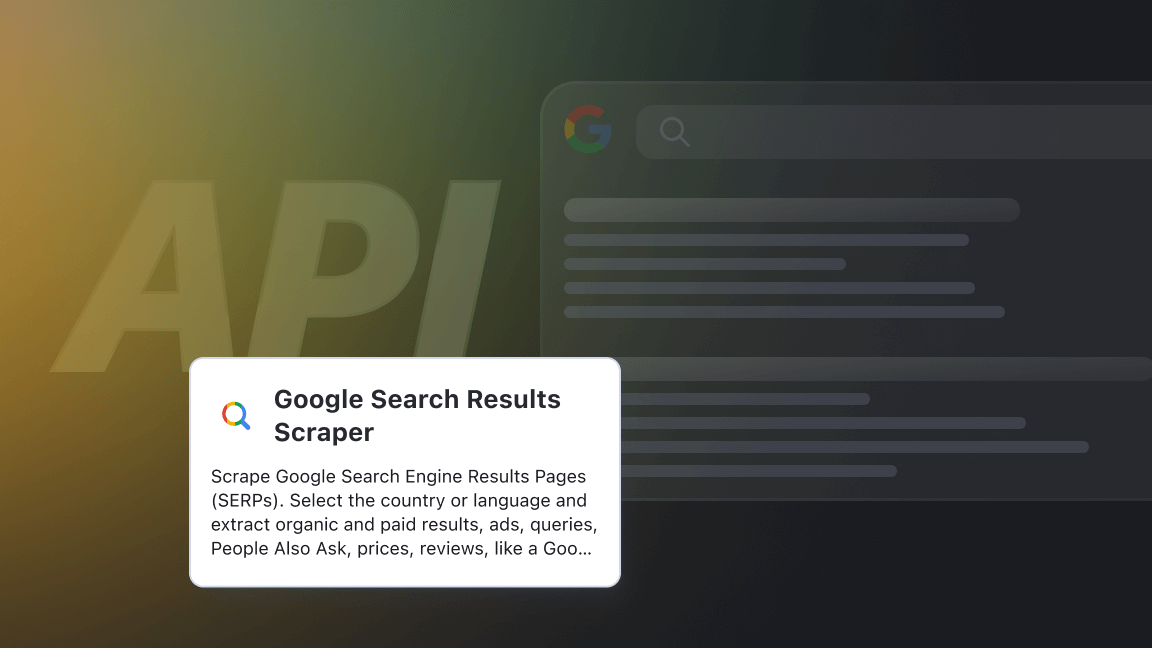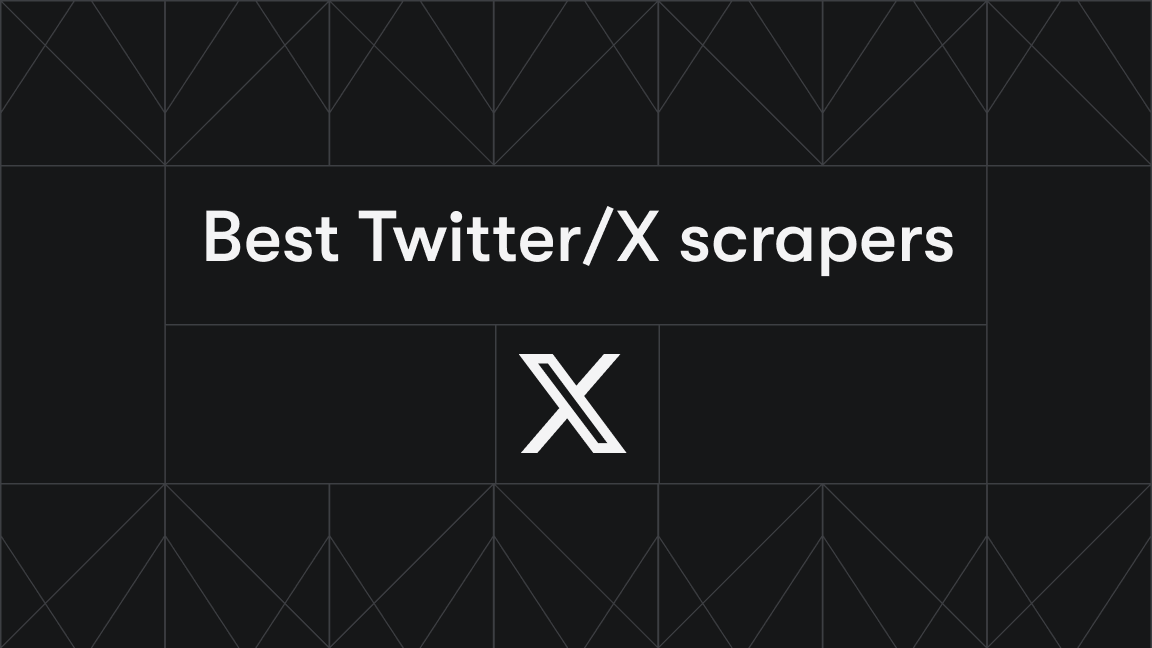Dynamic pricing only works when it’s grounded in real-time, market-wide visibility. But for most pricing managers and revenue teams, that visibility just isn’t there.
Pricing without market context creates four risks:
- Lost sales or revenue: Setting prices far above or below the industry average can quickly drive customers away or erode profit margins.
- Brand misalignment: For luxury or premium brands, poorly calibrated pricing can weaken perceived prestige and damage positioning.
- Competitive blind spots: Failing to track direct and indirect competitors can lead to missed opportunities or unintentional price wars.
- Ineffective promotions: Without ongoing price monitoring, discounts and seasonal offers may underperform or reduce profitability unnecessarily.
One way to mitigate these risks is to access pricing data through official e-commerce platform APIs, but collecting data this way comes with significant limitations:
- Platforms like Amazon or Walmart provide APIs only for approved affiliates or partners, and even then, usage is often restricted.
- Smaller retailers typically lack the technical capacity or business incentive to maintain public APIs.
Price scraping tools solve these challenges by automatically extracting pricing and product data directly from websites, without relying on official APIs. They transform raw web pages into structured, ready-to-analyze datasets with little to no coding required.
To bridge the pricing data gap left by APIs, here are five scraping tools that offer reliable, scalable alternatives:
- Apify
- Octoparse
- Price2Spy
- Import.io
- ParseHub
Let's see how they compare.
Best price scraping tools - Quick comparison
Not all price scraping tools are built the same - some excel at large-scale automation, others at fast one-click extractions.
| Tool | Ideal for | Key features |
|---|---|---|
| Apify’s E-commerce Scraping Tool | Multi-platform scraping (Amazon, Walmart, eBay, etc.) | Pre-built, no-code scraper for global & regional shops. JSON, CSV, Excel exports + API integration. Handles proxies, pagination, anti-bot protections. Automations via Apify Console & integrations. |
| Octoparse — Amazon Scraper (Template) | Quick Amazon keyword searches | Ready template for Amazon; zero setup. Works with up to 100,000 keywords/run. CSV/Excel/JSON exports. Optional proxy use ($3/GB). |
| Price2Spy | Enterprise-level price monitoring | Automated daily/hourly competitor price checks. Historical trend graphs & alerts. Multi-competitor SKU tracking. CSV/Excel/API exports. |
| Import.io | Large-scale, enterprise data collection | Visual extractor builder; point-and-click training. Daily change reports & alerts. Visualization via Import.io Insights. JSON/CSV/Excel/Sheets data exports + API. |
| ParseHub | General-purpose price scraping for dynamic sites | Desktop app with visual UI. Handles JS/AJAX/infinite scroll. Supports pagination & proxy rotation. Cloud scheduling. CSV/Excel/JSON/API output. |
1. Apify’s E-commerce Scraping Tool
E-commerce Scraping Tool is a no-code, all-in-one solution for extracting product and pricing data from virtually any online store, marketplace, or catalog. It supports major platforms, such as Amazon, Walmart, IKEA, and eBay, as well as regional and niche retailers. That makes it ideal for price monitoring, competitor analysis, and market research. With just a few inputs, you can configure and run scrapes without writing a single line of code. The tool delivers clean, structured datasets that include product titles, descriptions, prices with currency, SKUs, variants, stock status, images, and URLs, ready for export or direct integration with BI tools and dashboards.
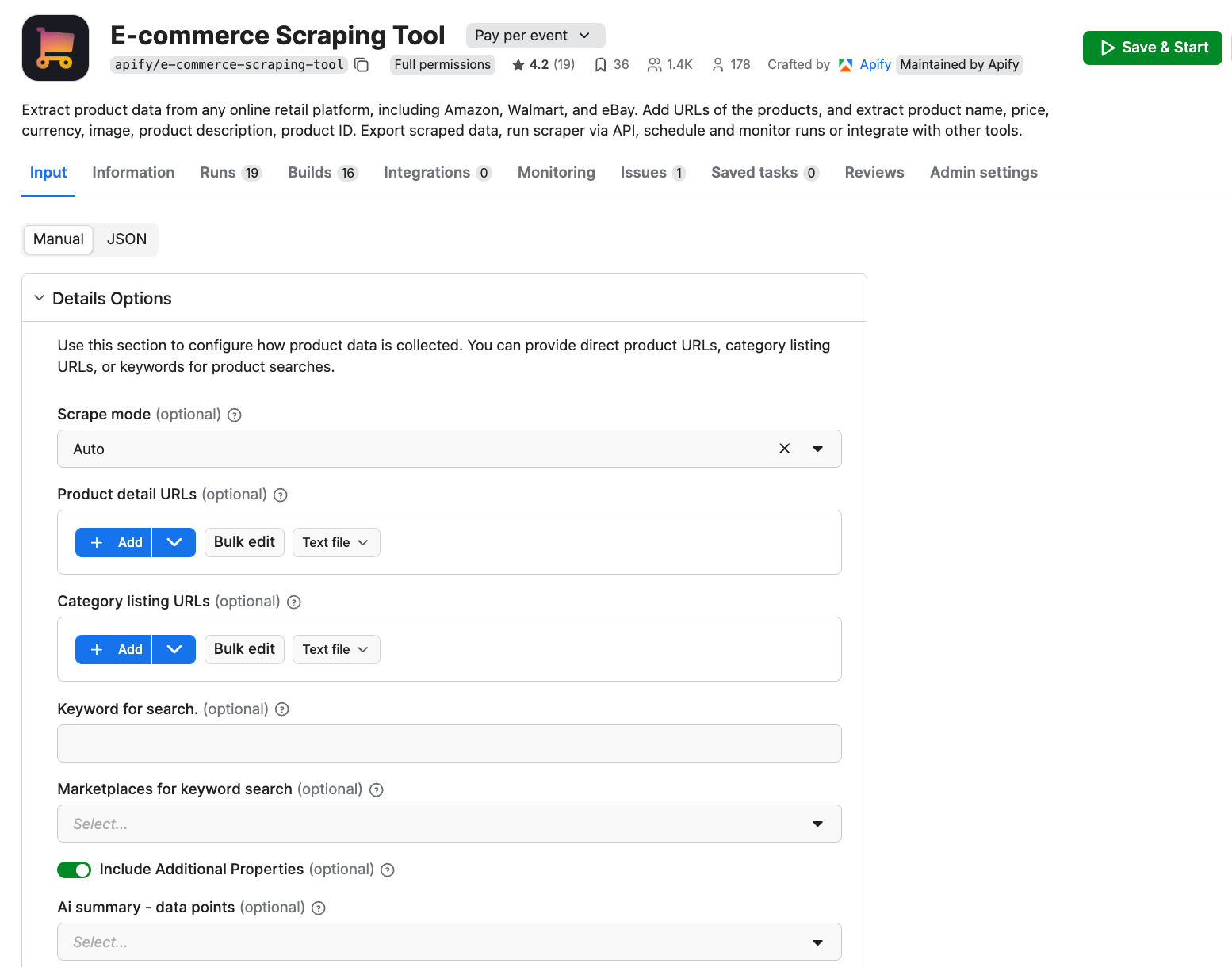
The tool also offers an AI summary feature, allowing you to get more out of your data, using natural-language instructions:
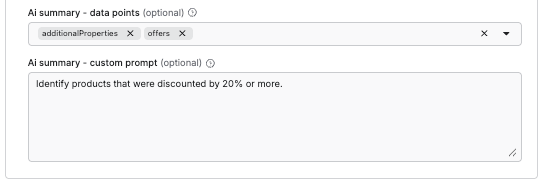
Pricing: Pay per event pricing model; $0.50 per 1,000 listing page scraped; final price depends on the type of scraped data and additional features such as residential proxy use or browser rendering.
Key features:
- Pre-built scraper with no-code configuration: You enter product or category URLs and click Start to run the scraper
- The $5 credit included in the Free plan lets you scrape roughly 800 product URLs
- You can download results in JSON, CSV, Excel, or integrate via API - ideal for sending structured data to dashboards like Power BI or Tableau
- Multi-shop support: It supports major marketplaces (including Amazon, Walmart, eBay, Alibaba, Etsy) and local e-shops worldwide, so you don’t need to use separate scrapers per store
- Apify Console enables automation with tasks, schedules, and automatic exports
- AI summary feature enriches your dataset with additional information
- Review scraping is available - You can extract customer reviews using product URLs, review listing URLs, or keyword searches
- Integrates with data analytics dashboards and platforms such as Zapier, Make, n8n, as well as other ready-made automation tools on Apify Store
- Uses proxies, handles pagination, and bypasses common anti-bot measures automatically
Limitations:
- Reliant on Apify’s updates: If an e-shop changes the HTML structure, you depend on Apify’s devs to do the fixes
- Complex pricing - additional fees for review scraping, browser rendering, or scraping Amazon products
2. Octoparse: Amazon Scraper (Template)
The Octoparse Amazon Scraper Template is a ready-made, no-code workflow for automatically collecting product and price data from Amazon. Instead of manually setting up selectors, you simply enter your keywords, choose your Amazon marketplace (e.g., .com, .co.uk, .de), and the template automatically identifies and extracts key product fields - such as title, ASIN, URL, price, rating, review count, and availability. Once the run finishes, you can easily export the dataset to Excel, CSV, or JSON for further analysis, reporting, or dashboard integration.
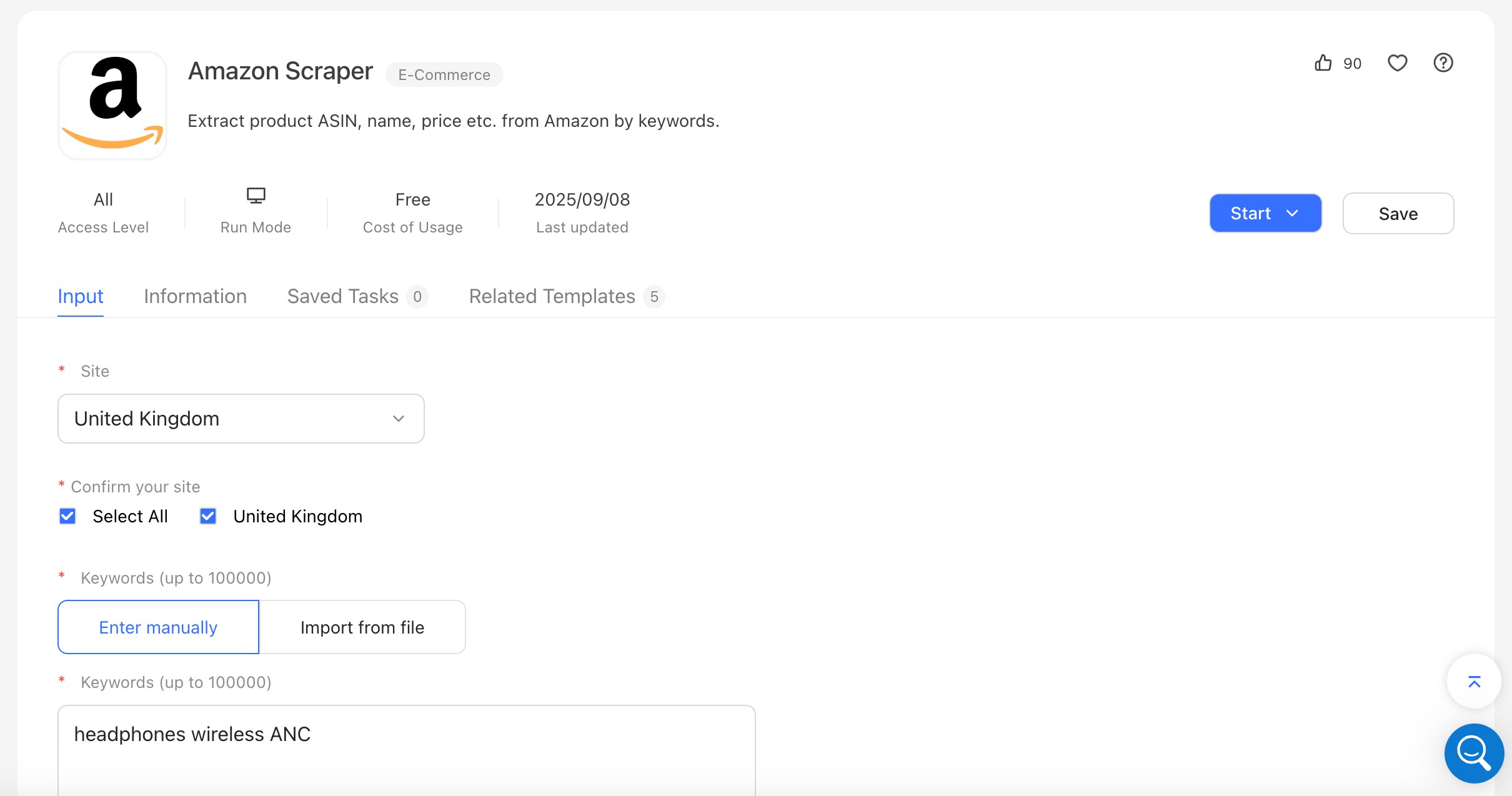
Pricing: From $83/month (Standard Plan)
Key features:
- Quick and easy setup - you add keywords, choose your Amazon marketplace, and scrape data without additional configuration
- Works with up to 100000 keywords for a single run
- Optional proxy use is available (comes with an additional cost of $3 per GB)
- Exports structured data (in CSV, Excel, or JSON)
- Detailed data fields including product name, ASIN, URLs, price, star rating, stock information, and more
Limitations:
- Runs locally only via the desktop app, using your own IP address
- If you encounter a CAPTCHA, you have to pause the task, resolve the CAPTCHA manually, and resume the task
- Limited to Amazon - no cross-platform support
- Doesn’t support scraping by URLs
3. Price2Spy
A platform designed for enterprise-level price monitoring - ideal for retailers, manufacturers, and pricing teams managing large product catalogs and tracking multiple competitors. You give Price2Spy a list of competitor product URLs (or keywords), and it automatically checks those pages on a defined schedule (daily or hourly). It extracts prices, tracks changes, and sends alerts, but you never see or touch the scraping process itself. All results are displayed in an interactive analytics dashboard that highlights price changes and competitive movements in real time. It also stores all historical data for trend analysis.
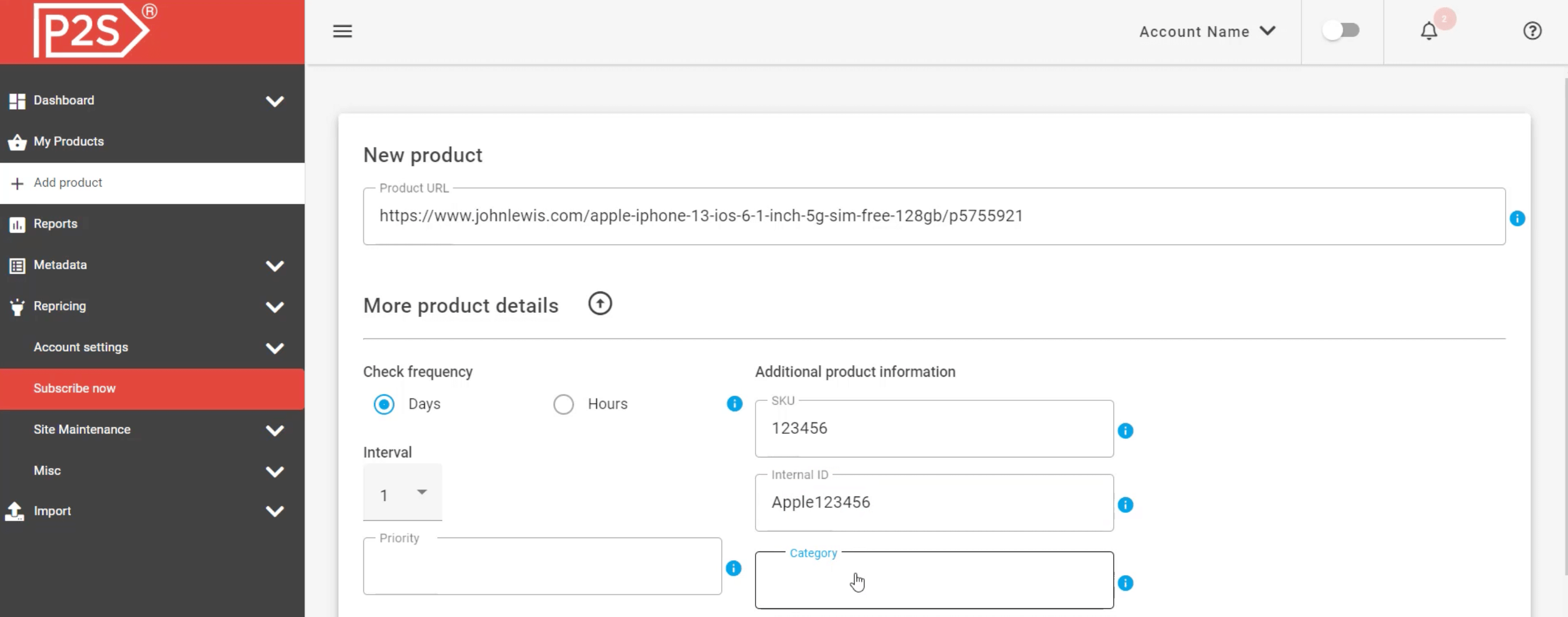
Pricing: From $57.95/month for up to 2,000 URLs
Key features:
- Automated price monitoring: Tracks competitor product URLs (scraping price, availability, promotions) on a defined schedule (daily, hourly, or custom intervals)
- Historical pricing charts and analysis to visualize trends and fluctuations
- Notifications when a competitor dips below a certain price threshold or changes offer conditions
- Data can be exported in CSV/Excel/JSON formats, or via API
- Multi-competitor tracking: You can monitor several competitor SKUs against your own to identify pricing gaps
Limitations:
- No workflow control - you get structured data and analytics, but the scraping process is fully managed
- Built for price tracking only - doesn’t scrape product information, reviews, or images
4. Import.io
Import.io uses a visual extractor builder. You paste a target URL (such as a product page or category page), then select the fields you want to capture (like price, title, image, seller), and the system learns the pattern and builds a structured extractor you can run without code. Once trained, the scraper can identify and pull the same data fields from hundreds or thousands of similar pages. You can scrape key attributes such as product name, price, currency, URL, SKU, rating, reviews, availability, category, brand, image URL, and the last update timestamp.
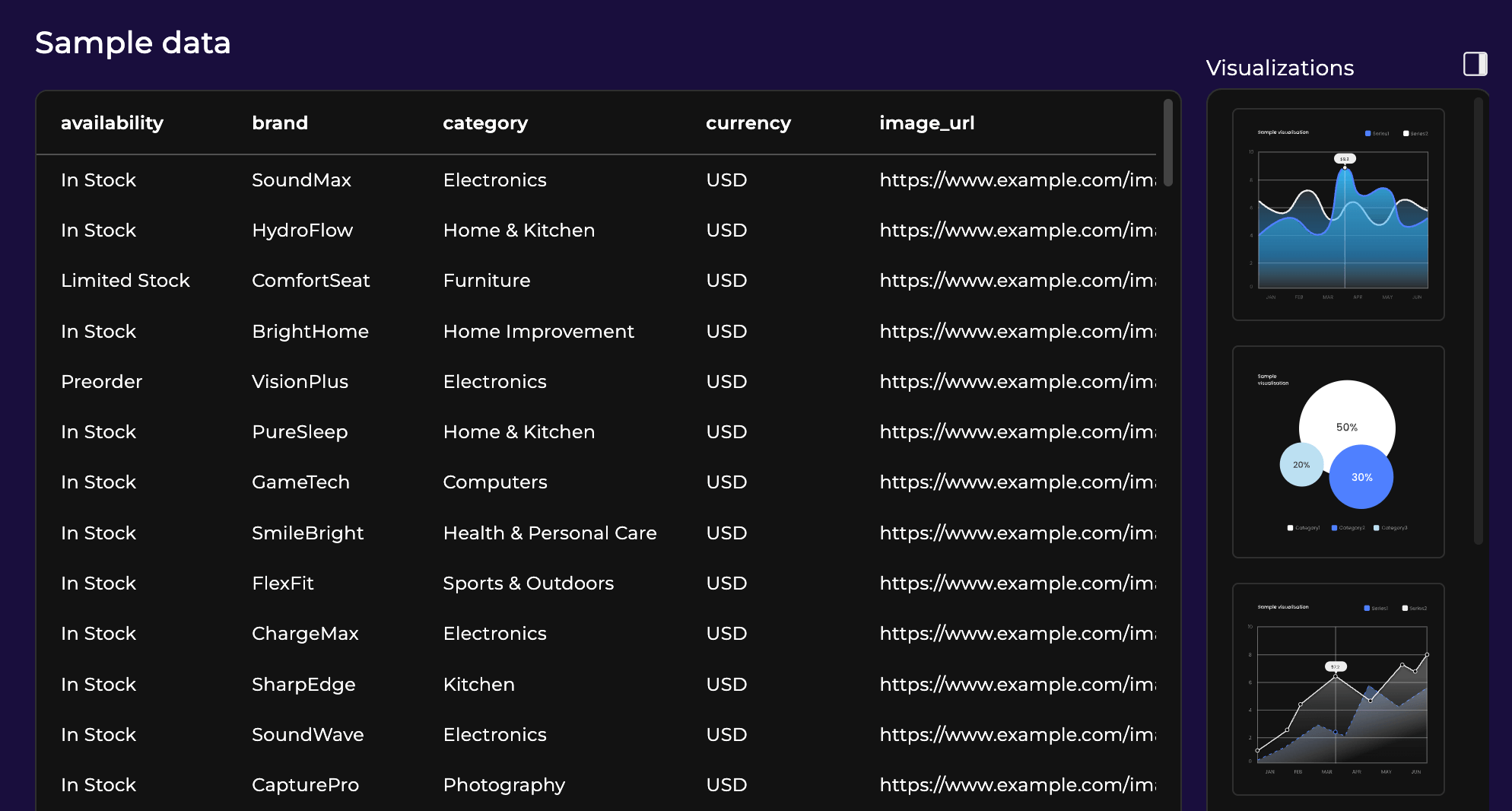
Pricing: $399 / month for 5,000 queries
Key features:
- Point-and-click scraper training - you select relevant fields directly on the web page
- You can schedule a change report to run daily and track when prices change, or items are removed or added to the category
- Visualizing the data in charts and graphs available via Import.io Insights
- Export available in JSON, CSV, Excel, Google Sheets; API access included
- Designed for large-scale projects (can handle thousands of queries and terabytes of data on a cloud-hosted infrastructure), which is relevant when monitoring large competitor datasets
- Real-time preview of extracted data before you run full-scale jobs
- Alerts when predefined thresholds are met or when extractor fields break
Limitations:
- Designed for enterprise-level scraping, reflected in the pricing plans - not suitable for smaller companies with limited budget; no free tier available
5. ParseHub
Provides a desktop application allowing you to design scraping projects using a visual UI: You navigate to a website, click on elements you want to capture (such as price, product title, seller), and the tool automatically identifies similar elements and builds a repeatable extraction flow. It can extract pricing and product data from any website - including those built with complex JavaScript or AJAX frameworks. Once the project is configured and your scraper trained, you can schedule runs (daily/weekly) in the cloud.
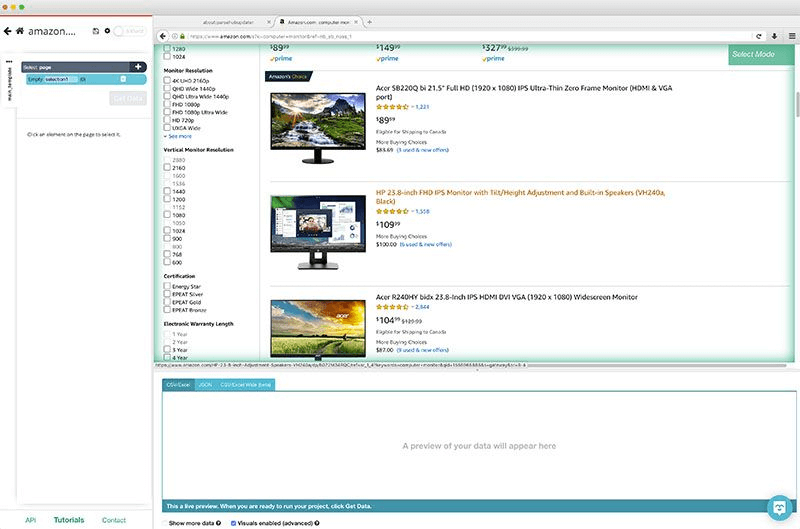
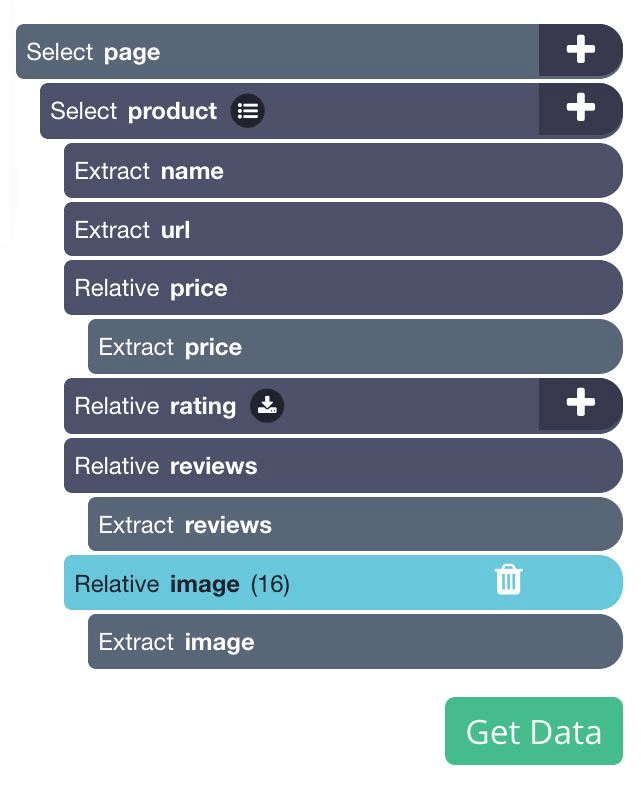
Scraping Amazon with ParseHub. Source: ParseHub
Pricing: From $189/month (Standard plan)
Key Features
- Handles dynamic websites - fully renders pages built with JS or AJAX
- Point-and-click graphic interface for scraper training
- Exports data in CSV, Excel, or JSON, and connects via API to integrate with BI tools, pricing engines, or dashboards
- It supports advanced extraction features: proxies/IP rotation, pagination
- Data preview pane shows what will be captured before you run the scraper to avoid errors
- Free tier allows scraping of up to 200 pages per run
Limitations
- You have to manually configure the scraper and retrain it whenever page structures change
- Proxy use isn’t available on the free plan
Choose the best scraper for your use case
Platforms like Apify, Octoparse, Price2Spy, Import.io, and ParseHub provide accessible ways to gather structured pricing and product information directly from websites, and each tool serves a slightly different purpose within a pricing team’s workflow:
- Apify’s E-commerce Scraping Tool - great for large-scale, multi-platform data extraction with strong automation and integration features
- Octoparse’s Amazon Scraper Template - suitable for quick Amazon-specific price tracking with minimal setup
- Import.io and Price2Spy - both offer enterprise-grade solutions for long-term competition tracking
- ParseHub gives users visual control and flexibility to build or customize their own scrapers





